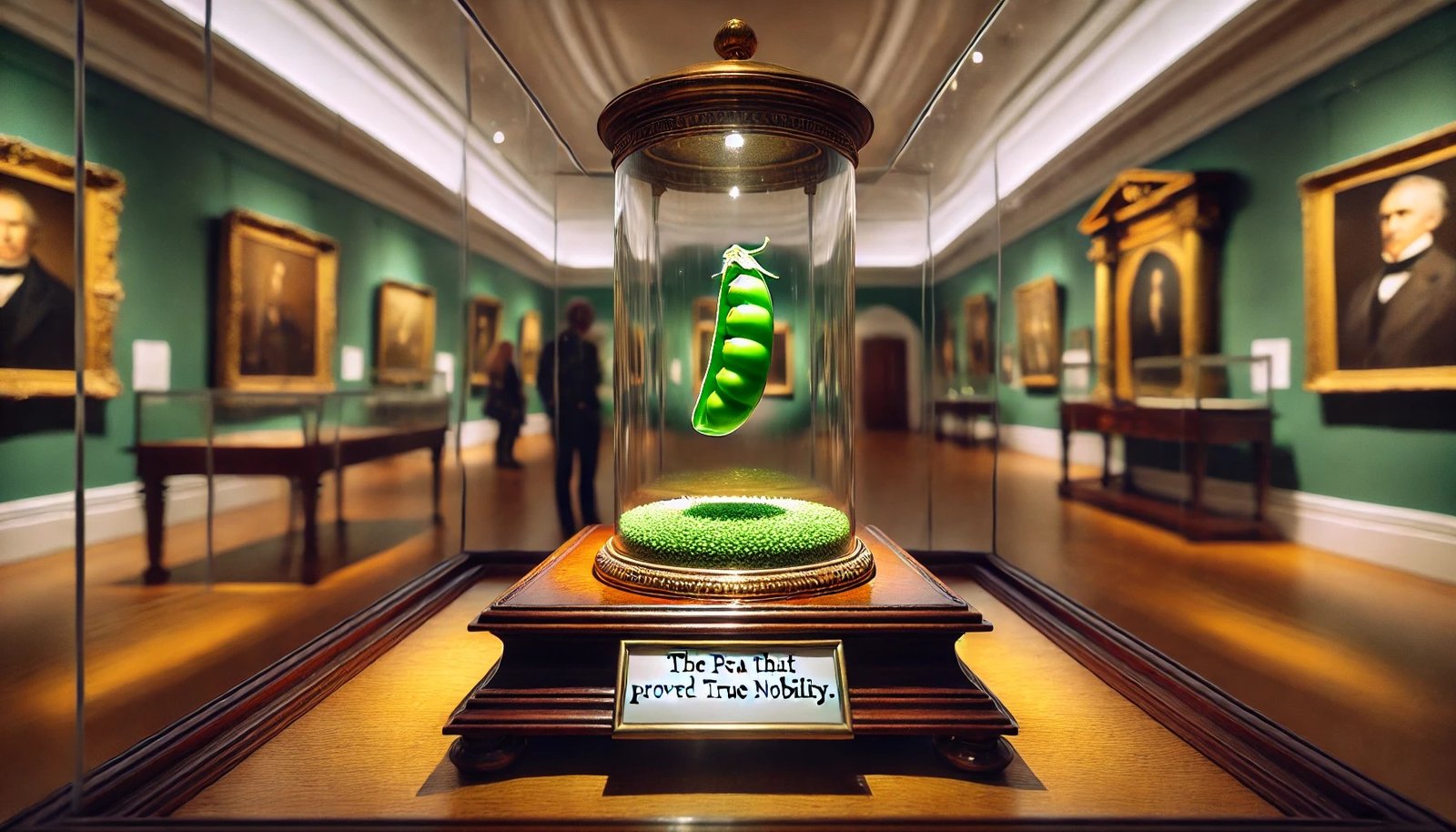The Pea of the Heart
Once upon a time, in a kingdom far away, there lived a young prince who was determined to marry a true princess. His parents, the king and queen, had raised him to be wise and kind, instilling in him the values of leadership and responsibility. The prince understood that his future queen needed to be more than just a title; she needed to possess true nobility—someone whose character, grace, and upbringing would align with the immense responsibilities of royalty.

The prince traveled far and wide, meeting many young women who claimed to be princesses. However, each time, he found something lacking. Some were too proud, others too vain, and some were kind but lacked the depth and understanding required to handle the subtle complexities of ruling a kingdom. The prince sought a woman who could balance the demands of leadership with empathy and grace—someone who could manage not just the grandeur of royal life but also the finer, more delicate aspects of it.

Disheartened by his search, the prince returned to the castle, worried that he might never find the one he sought. He wanted a partner who could see and address the needs of others, even when those needs were subtle and not easily apparent—a skill vital for a ruler who must care for all subjects, great and small.

One stormy night, as thunder roared and lightning flashed across the sky, there came a knock at the castle door.

The king himself went to answer, finding a young woman standing in the pouring rain. She was soaked to the skin, her clothes clinging to her body, and she looked weary from the journey. Despite her bedraggled appearance, there was something undeniably regal about her bearing.

"I am a princess," she said, her voice steady despite the storm. "I have traveled far, seeking shelter from this terrible storm. May I please stay the night?"
The queen, who had followed her husband to the door, looked at the young woman with a discerning eye. She knew how important it was to determine whether this girl was truly a princess, so she devised a subtle and clever test.
"Of course, my dear," the queen said with a warm smile. "But first, you must allow us to prepare a bed for you. You must be very tired."
The queen led the young woman to a room and ordered that twenty mattresses be piled on top of each other, with twenty soft quilts laid on top of the mattresses.

But just before the last mattress was placed, the queen secretly slipped a small, hard pea underneath the bottom mattress.

The queen's test was about more than just physical sensitivity. She knew that a true princess—someone of noble character and refined upbringing—would be someone attuned to the slightest discomforts, not just for herself but for others as well. A person who could feel a pea through so many layers would not merely be physically sensitive; she would be someone who noticed and cared about even the smallest issues, a quality crucial for a queen who must be attentive to the needs of her people, even when those needs are not immediately visible.
The princess was shown to her bed, and though it was extraordinarily high, she climbed up and settled in for the night.

However, sleep did not come easily to her. She tossed and turned, unable to find a comfortable position. The bed, which should have felt like a cloud, felt uneven, as though something hard was beneath it, disturbing her rest.
The next morning, the princess appeared pale and weary, her eyes ringed with dark circles. When the queen asked how she had slept, the young woman hesitated before replying.

"Your Majesty, I do not wish to offend, but I did not sleep well at all. There was something in the bed that pressed against me all night. It was so uncomfortable that I could hardly close my eyes."
The queen smiled, knowing that this was the proof she needed. The princess's ability to sense the discomfort from a tiny pea through so many layers revealed not just sensitivity, but an innate attentiveness—a sign of a person who would notice and address the smallest discomforts, whether they affected her or others. This level of awareness was what the queen and the prince had been searching for: someone who could be a caring and conscientious ruler.
The prince, who had overheard the conversation, was overjoyed. He had finally found his true princess, someone who possessed both the grace and the keen awareness that a royal life demanded. She was someone who would care deeply about the well-being of her people, no matter how small or seemingly insignificant their needs might be.

The prince and the princess were soon married in a grand ceremony, and they lived happily ever after.

As for the pea, it was placed in a museum, where it can still be seen to this day—unless someone has taken it, of course.

And so, the prince and his true princess ruled the kingdom with wisdom and kindness, proving that true nobility lies not only in titles but in the ability to care deeply for every detail that affects the lives of others.